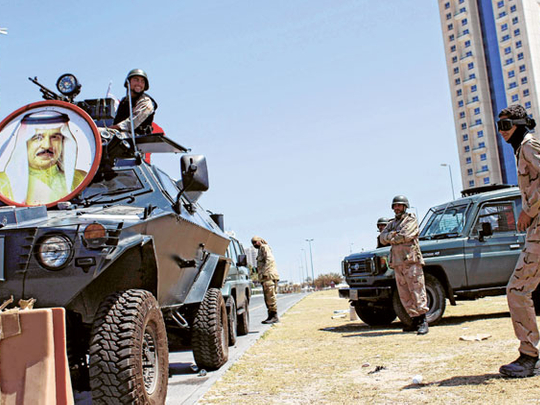
Manama: Bahrain's largest Shi'ite opposition group Wefaq has accepted Kuwait's offer to mediate in talks with Bahrain's government to end a political crisis gripping the tiny kingdom, a member of Wefaq said on Sunday.
Bahrain on March 16 ended weeks of protests by mostly Shi'ite protesters that had prompted the king to impose martial law and call in troops from fellow Sunni-ruled neighbours.
Jasem Hussain, a member of Wefaq, said Kuwait's Emir Shaikh Sabah Al Ahmad Al Sabah has offered to mediate between Bahrain's Sunni Al Khalifa ruling family and Shi'ite opposition groups.
"We welcome the idea of bringing in an outside element," Hussain told Reuters.
He said that Wefaq's had no conditions for entering mediation talks but the presence of foreign troops in Bahrain would be a thorny matter in the discussions.
Wefaq and its six allies said last week they would not enter talks offered by Bahrain's Crown Prince unless the government pulled troops off the streets and freed prisoners.
Hussain said talks must be based on issues outlined by Bahrain's Crown Prince Shaikh Salman Bin Hamad Al Khalifa before Gulf state troops entered Bahrain.
These include an elected government and reform of electoral districts that the opposition says were cut to ensure a Sunni majority in parliament.
"The fear is that the results (of mediation) may not be acceptable to the opposition or that they can't be sold to the public," said Hussain.
Sunni-led Saudi Arabia and the United Arab Emirates, which view Bahrain's ruling family as a bulwark against regional Shi'ite power Iran, have sent troops to Bahrain to help it quell weeks of unrest following pro-democracy protests.
Kuwait, which has a Shi'ite minority of its own, has sent navy vessels to Bahrain under a Gulf security pact to patrol its Northern coast line.
Wefaq and its allies also want an elected council to redraft the constitution, a demand over which preliminary talks with Khalifa collapsed shortly before Gulf troops arrived and Bahrain drove protesters off the streets and banned public gatherings.
More than 60 per cent of Bahrainis are Shi'ites, and most are campaigning for a constitutional monarchy, but calls by hardliners for the overthrow of the monarchy have alarmed Sunnis, who fear the unrest serves Iran, separated from Bahrain by just a short stretch of Gulf waters.
The ferocity of the government crackdown has stunned Bahrain's majority Shi'ites and angered Iran.
A Wefaq delegation is set to meet Kuwaiti politicians including Parliament Speaker Jasem Al Kharafi, Kuwaiti daily Al Seyassah said on Sunday citing unnamed political sources.
Ali Al Matrouk, a Kuwaiti Shi'ite businessman is one of the Kuwaiti mediators, Wefaq's Hussain said.
Bahrain cut curfew times again, by an hour, on Sunday. From Seef Mall through the financial district to the diplomatic area the curfew now runs from 11pm (0200 GMT) to 4am (0700 GMT), cut gradually from 12 hours when it was first imposed.











